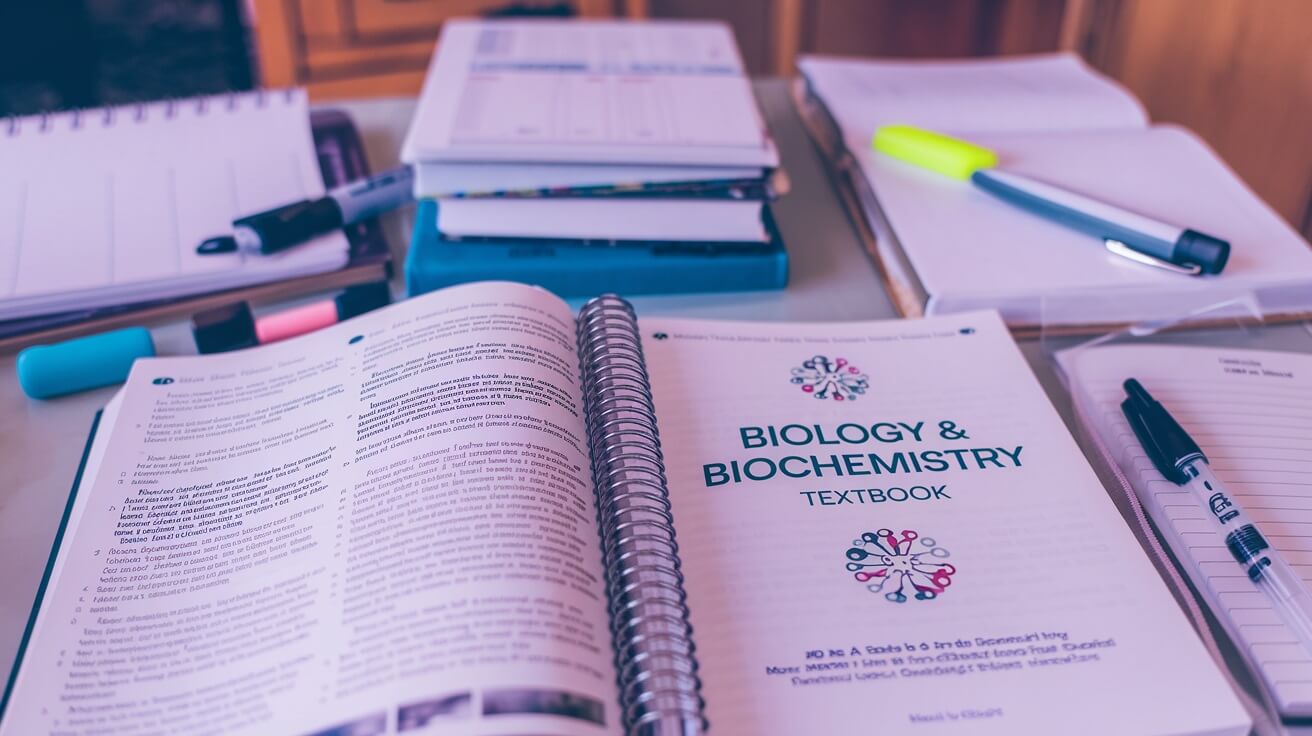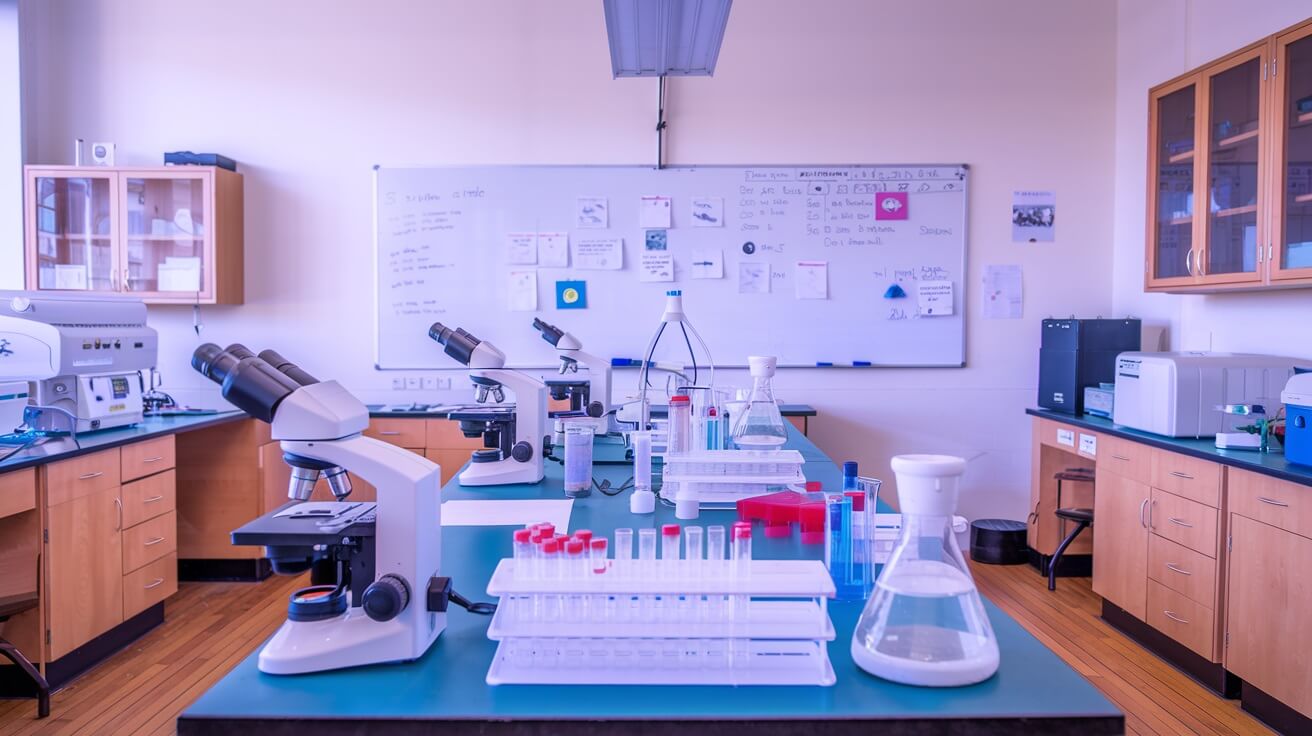
Effective Study Techniques for Biology and Biochemistry: Master Your Science Subjects
Do you need help with biology and biochemistry? You’re not alone. These subjects are notorious for their dense material and intricate details, often overwhelming students.
Concepts like biochemical pathways and cellular functions can be daunting. How about making these subjects more accessible and more interesting to study?
Effective study techniques for Biology and Biochemistry can turn complex topics into manageable chunks. This guide dives into proven methods like active recall, spaced repetition, and concept mapping, offering practical tips to help you retain information longer, study more brilliantly, and boost your grades.

Active Recall: Strengthen Your Memory, Boost Your Understanding
What is Active Recall?
Active recall is a game-changer for memory retention. Instead of passive reading, it involves pulling information directly from memory, making your brain work harder and strengthening your ability to retain knowledge. Think of it as a mental workout.
How to use active recall in biology and biochemistry
- Flashcards for Key Terms: Subjects like biology and biochemistry come with many technical terms—everything from enzymes to metabolic pathways. Flashcards, especially digital ones like Anki, help you test yourself regularly.
- Practice Recall After Reading: Close your book after a chapter and try writing down everything you can remember. This process highlights what you truly know and what needs more attention.
- Turn text into questions: Make questions out of chapter headings. For example, if you’re reading about photosynthesis, ask yourself: What are the stages of photosynthesis? Challenge yourself to answer without looking at notes.
This simple habit of active questioning and self-testing makes studying more engaging and helps embed concepts deeper into your memory.
Spaced repetition: make it stick for the long term.
Why Spaced Repetition Works
Cramming the night before may get you through a test, but it won’t help in the long run. Spaced repetition enables you to reinforce knowledge over time, reducing the brain’s tendency to forget.
It’s a method that allows you to review content at increasing intervals, which helps shift information from short-term to long-term memory.
How to Integrate Spaced Repetition into Your Studies
- Review at Intervals: Start by studying new content, then revisit it after 24 hours, a week later, and again in a month. This gradual review keeps information fresh.
- Use Technology: Apps like Quizlet and Anki are designed for spaced repetition. They automatically adjust review timings based on how well you know the material.
- Focus on Challenging Topics: Use spaced repetition to review the trickiest parts of your curriculum, like amino acid structures or the steps of the Krebs cycle.
By spacing out your study sessions, you won’t just memorize facts—you’ll truly understand and retain the material.

Concept Mapping: Visualize Complex Ideas
Why concept maps are powerful
The Biology and biochemistry aren’t just about memorizing facts; they involve understanding how systems interact.
Concept maps help you visualize these interactions, making it more straightforward to understand how ideas are interconnected and flow together.
How to Create Effective Concept Maps
- Start with a Core Idea: Place your main topic, like "cell respiration," in the center and create a section with related subtopics like glycolysis, Krebs cycle, and electron transport chain.
- Color Code Connections: Use different colors to highlight various stages or components. This makes complex diagrams more straightforward to read and recall.
- Connect and Relate: Draw arrows to show relationships between elements. For example, illustrate how ATP production links with cellular respiration processes.

Example: Mapping Out the Immune System
Here is an example: let’s say you’re studying the immune system. Start with a bubble for innate immunity and another for adaptive immunity. From there, they branch out to cells like macrophages and T cells. This structure helps you see the bigger picture while understanding each component's role.
Practice Tests: Learn by Doing
Why Practice Testing Matters
Reading and reviewing notes is effective, but what really outstanding successful students is their practice with testing. It gives you a taste of exam conditions and helps you identify weak spots and areas needing more focus.
Effective Practice Testing Strategies
- Many academic institutions and online resources offer past exam papers. These are excellent for familiarizing yourself with question formats and the depth of answers expected.
- Set a timer and take a practice test as if it were the real deal. This helps reduce exam anxiety and improves time management.
- Don’t just move on from wrong answers. Take time to understand what you got wrong and why. Retry similar questions to solidify your understanding.
Example: Where to Find Practice Tests
There are too many online resources, such as Khan Academy and Coursera, and university libraries often have access to mock exams and quizzes tailored to biology and biochemistry subjects. Use these to your advantage.

Time Management: Get the Most Out of Every Minute
Why Time Management Is Key
A well-planned study schedule can be the difference between success and burnout. It’s not about studying for endless hours but about learning effectively.
Time management techniques that work.
- The "Pomodoro Technique" is an effective time management technique in which you work for 25 minutes and then take a 5-minute break. This keeps your mind refreshed and focused on the task.
- Divide your study time into manageable chunks, focusing on different subjects at different times—for example, mornings for biology and afternoons for biochemistry.
- Instead of vague goals like “study biology,” aim for specifics, like reviewing enzyme functions or completing notes on DNA replication.
Example: A Sample Study Plan
- New chapter study (2 hours) and flashcard review (30 minutes) on Monday.
- Create concept maps (1 hour), then practice with recall questions (30 minutes) on Tuesday.
- Take a practice quiz (1 hour), followed by a review of mistakes (30 minutes) on Wednesday.
A structured approach helps you maintain progress without feeling overwhelmed.
Relating Study Concepts to Everyday Life
Making Learning Personal
Have you ever felt like you’re cramming facts that don’t stick? The secret to deeper learning is connecting concepts to the world around you. Biology and biochemistry aren’t abstract—they’re happening all around us.
Real-World Examples for Deeper Understanding
- Metabolic Pathways in Sports: When you exercise, you’re putting the principles of glycolysis and cellular respiration into practice. This connection can help make the process more memorable.
- Understanding Medications: If you’ve ever taken medicine, you see biochemistry. Knowing how drugs interact with enzymes in your body can make studying enzyme kinetics more relatable.
- Climate Change and Photosynthesis: Studying Photosynthesis? Relate it to how plants absorb carbon dioxide, impacting global carbon cycles. It makes the learning process helpful and more engaging.
Example: The Glycolysis-Energy Connection
Think of the quick burst of energy you feel during a sprint—glycolysis is at work, breaking down glucose to fuel your muscles. Understanding this connection makes learning about glycolysis more intuitive.
Conclusion:
Studying biology and biochemistry doesn’t have to be a struggle. You can turn dense material into digestible parts by using methods like active recall, spaced repetition, and concept mapping.
Remember, the key isn’t how long you study but how well you study. Implementing practice tests, efficient time management, and connecting lessons to real life can make your study sessions more productive.
Now’s the time to apply these strategies and see the difference. Start with one technique—like creating a concept map for your next chapter—and build from there.
With the right approach, you’ll go into exams prepared and confident. Let’s turn those study struggles into study success!
Call to Action:
Are you feeling overwhelmed by biology and biochemistry? Don’t be.
Start using these study techniques today and see how they transform your learning experience.
Share your progress with study groups or friends, and watch as your grades improve. You can master these subjects—one study session at a time!
College Education Study Tips Students

